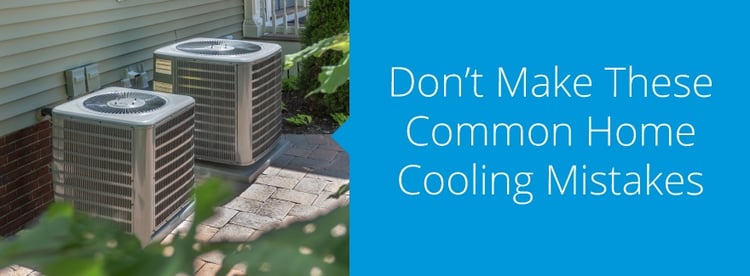
For most of America, air conditioning has become the summertime standard. According to the Department of Energy, 75% of all American homes have air conditioning installed and use about 6% of all energy produced in this country at the cost of $29 billion annually.
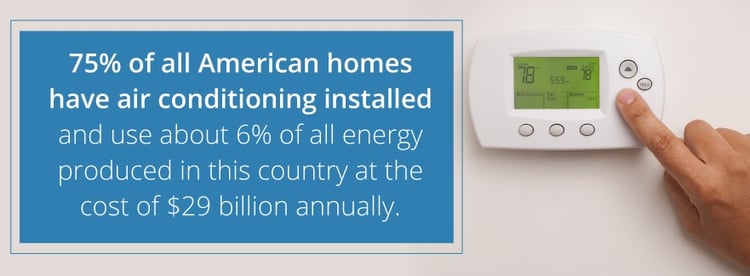
As Americans become increasingly green-minded, many are taking steps to reduce energy use while still keeping their house comfortable. But how do you keep electricity costs low during the summer without sweating through your shirt?
The best way to do so is to avoid these common air conditioning mistakes. By busting a few home cooling myths and improving the way you use your air conditioning, you will find new ways to save money on home cooling. Join us as we address some of the most common home cooling mistakes homeowners across the country make all summer long.
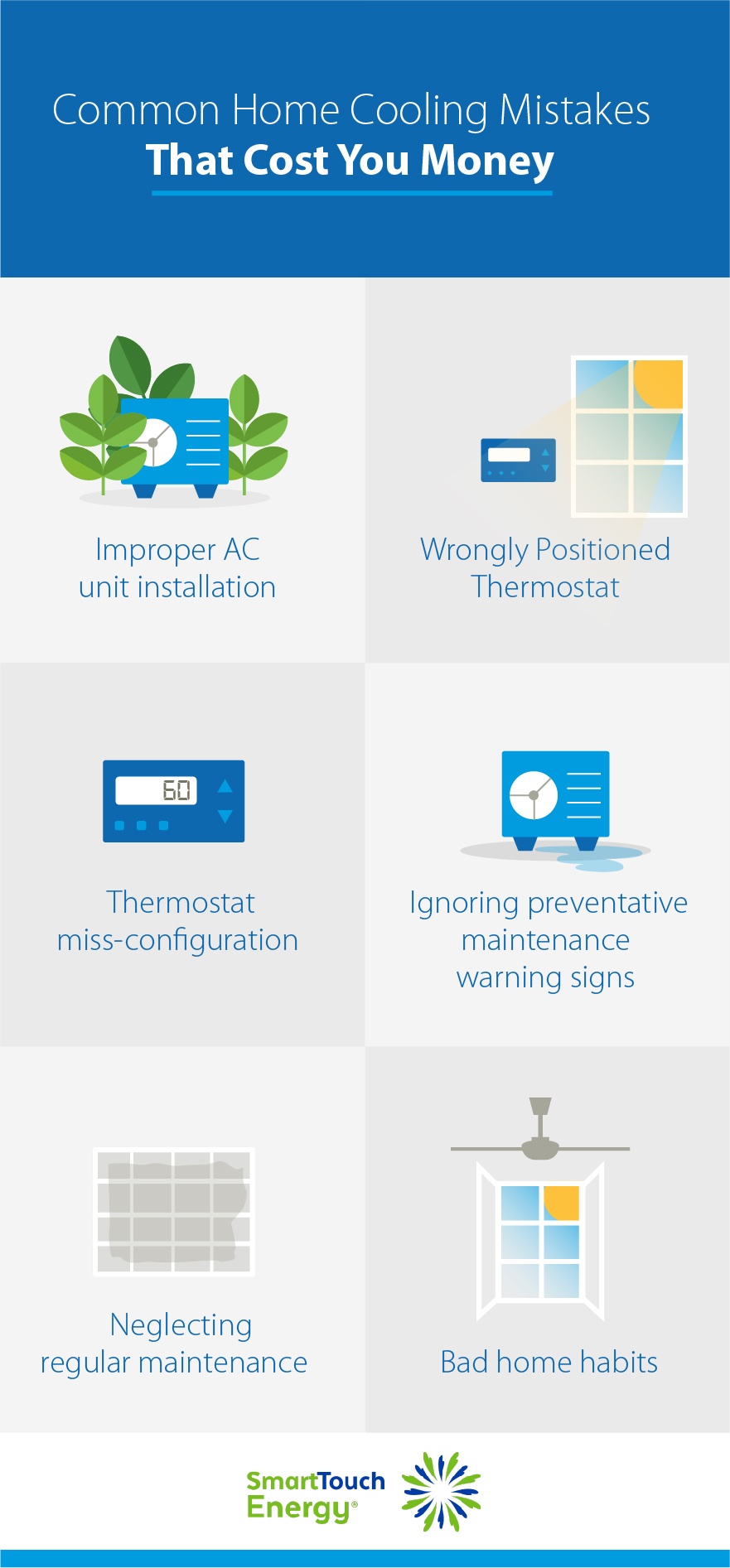

This work is licensed under a Creative Commons Attribution-NoDerivs 3.0 United States License.
Not Dressing for the Weather
This may seem like a no-brainer, but you can save money by dressing in a way that allows you to keep your house warmer during the day. By wearing lighter clothes made with cotton and linen, you can be more comfortable despite running the air conditioning less. While you may need a blazer or a tie when you go into the office, take it off as soon as you get home. Let your company pay the energy bills required to keep you cool in business attire.
Hiding Your Air Conditioner
We all want our landscaping to have that magazine cover look. Unfortunately, a bulky central air conditioning unit isn’t exactly the most attractive landscape feature. Many try to use shrubbery or other plants to camouflage their air conditioning unit. While this may hide an eyesore, it can also hinder your air conditioner’s functionality.
Leaves can get caught in your air conditioning unit, impeding air flow. Dirt, dust and other small pieces of debris can clog up your HVAC system while reducing air quality.

That’s why you need to keep debris and other potential obstructions away from your air conditioning unit. This includes things above your air conditioner. Manufacturers recommend at least a five-foot clearance between the top of the air conditioner and the lowest point of whatever object is above it. Even trees and branches far above the five-foot minimum can cause issues, as falling leaves can cause issues.
If you can hide your unit without placing plants or other obstructions too close, then go for it. Otherwise, it is best to make a small visual sacrifice for the sake of comfort and functionality.
Wrongly Positioning Your Thermostat
Thermostats are relatively simple devices, but, if you install them improperly, they can disproportionately and adversely affect your electric bill. For example, if you place your thermostat too close to a sun-soaked window, it is likely that the thermostat will read the room temperature far warmer than it is. When this happens, you will be running your air conditioner long after you have reached the desired temperature.
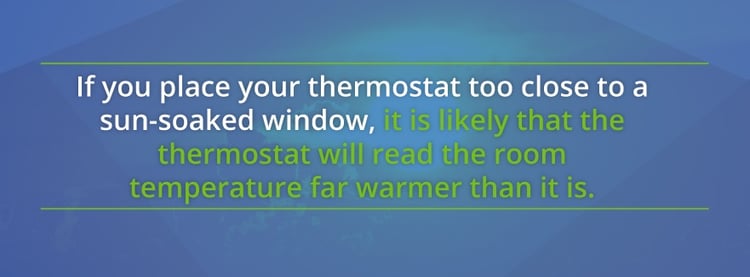
You also want to avoid exterior walls, as they are more strongly influenced by the temperature outside. Again, this will make the thermostat misread the ambient temperature of your room.
Finally, don’t place your thermostat in a rarely used hall or back room. You want your thermostat in the room that is used most consistently and best represents the desired temperature for your whole house. Older homes are especially susceptible to variant temperatures from room to room, so avoid either the warmest or coolest room in your home.
Many thermostats are advertised as easy to install for do-it-yourselfers. If you have experience with these kinds of devices, they aren’t too hard to install properly. But remember, your thermostat will strongly influence both your cooling and heating costs. If you aren’t sure about your ability to install your thermostat properly, it will likely be most cost-effective to leave it to a professional.
Placing Appliances Next to Your Thermostat
Even if you have your thermostat in the right place, you may have other items placed too close to the thermostat.
Don’t place a floor lamp directly in front of your thermostat. The light bulb will generate heat when it is turned on, fooling the thermostat into thinking the room is far warmer than it is. A television set can have the same effect.
Make sure your thermostat is well clear of any heat-emitting appliances or devices.
Ignoring Strange Noises
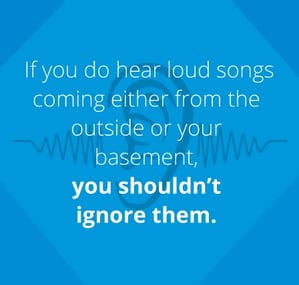 These days, both furnaces and air conditioning units are designed to operate quietly. Gone are the days when loud knocking was a common feature of HVAC systems. If you do hear loud songs coming either from the outside or your basement, you shouldn’t ignore them. Loud noises are a sure sign something is going wrong.
These days, both furnaces and air conditioning units are designed to operate quietly. Gone are the days when loud knocking was a common feature of HVAC systems. If you do hear loud songs coming either from the outside or your basement, you shouldn’t ignore them. Loud noises are a sure sign something is going wrong.
At this point, you need to call a professional to get the issue properly diagnosed. Central air conditioning is a delicate system, so you don’t want to tinker with the unit on your own. Plus, the cost of service will likely pale in comparison to the cost of a total unit replacement!
Ignoring Strange Smells
Just like loud sounds are a bad sign, so too are abnormal, stale smells. While it is normal for air conditioning to have a subtle distinct odor, if the smell changes, you need to get it addressed. It could be the air conditioning unit itself, or there may be something wrong with the ductwork.
You could spend days pulling your system apart looking for the cause, or you could bring in a professional who can diagnose the problem quickly and provide you will a solution that is as quick and painless as possible.
Forgetting Your Filters
Filters are pretty simple things. They pull dust and debris out of the air that is being recycled through your system.
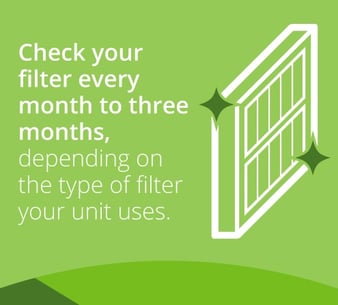 Unfortunately, because they are so simple, they are also easy to forget about. Even if they are simple, they are still very important and can have a profound influence on the functionality of your HVAC system. As the filter becomes clogged with dust, it obstructs air flow, meaning the air conditioning unit can’t get new air to cool.
Unfortunately, because they are so simple, they are also easy to forget about. Even if they are simple, they are still very important and can have a profound influence on the functionality of your HVAC system. As the filter becomes clogged with dust, it obstructs air flow, meaning the air conditioning unit can’t get new air to cool.
There have even been reports of air conditioning units freezing in the middle of summer. Because air isn’t moving, the same air keeps getting colder and colder until finally, it reaches the freezing point. Check your filter every month to three months, depending on the type of filter your unit uses. Investing in a new filter every month is far more economical than fixing a frozen, damaged unit.
Neglecting Insulation
The older the home, the more likely cold air is escaping through gaps in the insulation. During the winter, it is easier to notice leaky windows, as the cool draft will be felt as you move about the house. However, during the summer, the draft will be leaving your home, not the other way around.
The best way to determine if you need to improve insulation is to get a home energy audit. These have become increasingly popular as more Americans try to live a more environmentally-friendly lifestyle. It will determine what your energy use is like and the best solutions for solving your home’s particular energy-efficiency issues.
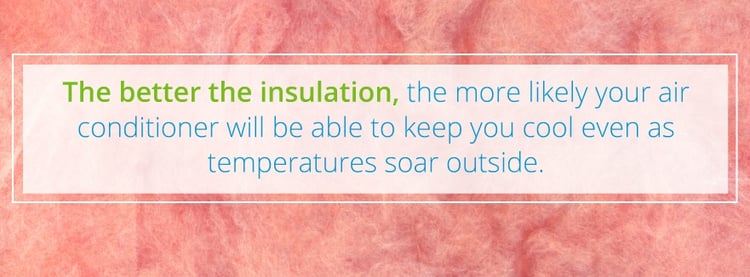
If you don’t want to invest in a professional home energy audit, you can perform a do-it-yourself audit as well. Sometime during the heat of summer, go outside and run your hand along your windows and see if you can feel air escaping. If you do, place a bead of caulk along the leak. Even this small maintenance step can go a long way.
Keeping the Blinds Open
There is something delightful about letting your home be bathed in natural light. In the middle of summer, that natural light is also natural heat. To lower your energy costs, consider keeping the blinds closed on sun-facing windows and changing which ones are open and closed throughout the day. By leaving the blinds open that face the opposite direction of the sun, you will still get plenty of natural ambient light without the heat.
Ignoring Humidity
When you turn on the news and check the weather in the summer, you will often hear the forecaster talking about the heat index in addition to the temperature. That’s because the more humid the air, the warmer it will feel. Humid air inhibits the evaporation of sweat, as the air is already saturated with moisture.
The same principle applies to your home. Consider adding a dehumidifier to your HVAC system. Not only will this make your home more comfortable, but it will benefit your home in other ways. Wood floors can warp in excessively humid homes. Humid homes are more susceptible to mold and spores. Metal fittings can rust and corrode.
You can opt for either a single room dehumidifier or tie a whole-house dehumidifier into your central HVAC system. The latter is costlier upfront, but the added home value plus the long-term savings make it well worth the investment.
Expecting Too Much From Your Air Conditioning
Air conditioners have come a long way. But the truth is, our homes are much larger and not as well-insulated as a refrigerator. That means that, despite operating under the same principles, you air conditioning unit might not be able to keep your home in the 60s when the temperature outside reaches triple digits.
Of course, insulation is a big factor in this. The better the insulation, the more likely your air conditioner will be able to keep you cool even as temperatures soar outside. But sometimes, even under the best conditions, you may have to put up with slightly higher temperatures inside.
Never Adjusting the Temperature
There is a weird myth circulating among some homeowners that it is more efficient to run the AC all day long than to let is switch on and off. This is flatly false. Your air conditioner is designed to turn on and off, making small adjustments to your home’s temperature to maintain the desired level.
If you have a standard thermostat, raise the desired temperature when you leave for work during the day. But an even more efficient way to make cost-saving adjustments is to invest in a programmable thermostat
. Programmable thermostats help you make adjustments to the desired temperature regularly throughout the day. This is great as it means you won’t be running your air conditioner at full blast when the house is empty.
Fluctuating Temperatures Throughout the Day
Small adjustments are great and are an effective way to lower energy costs. However, many homeowners take this too far, and they allow their homes to warm up too much during the day.
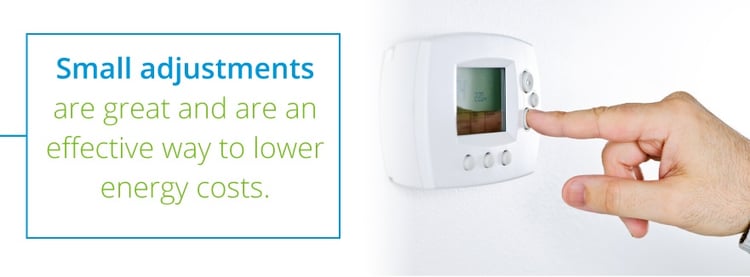
When you do this, you force your air conditioner to work much harder getting your home down to the desired temperature again. This stress can use more electricity in the long run than it would if you maintained the temperature all day long. Instead of letting the temperature fluctuate as much as ten degrees, keep the variance between three to four degrees.
However, if you are planning on leaving for vacation or an extended business trip, you can let the temperature fluctuate more. You don’t want to turn the air conditioner off completely, but the added stress of re-cooling your home will still be offset by a week’s worth of energy savings.
Cranking the Thermostat
Many homeowners use a flawed logic when they adjust the thermostat, leading to a costly home AC myth. They assume that adjusting the temperature lower than desired — turning it to 60 degrees when you want it to be 67, for example — will mean the room will cool faster, but that’s not how air conditioners work. The temperature of the cool air doesn’t fluctuate. Instead, very cool air is pushed through your home until the ambient temperature reaches the desired level.
The problem with cranking the thermostat is that many homeowners forget they overcompensated. That means the air conditioner won’t shut off until it reaches the set temperature, which is, in this case, well-below the temperature desired. All the effort the air conditioner put into making your home colder than desired is wasted.
Forgetting About Ceiling Fans
Many people consider ceiling fans to be an outdated technology made obsolete by the invention of air conditioning. However, when used together, ceiling fans reduce the amount of time you run your air conditioning unit, and ceiling fans are far more energy efficient.
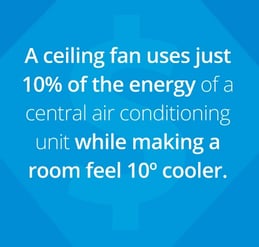 A fan is a great way to keep the air conditioner off altogether. In fact, according to the National Resource Defense Council (NRDC), a ceiling fan uses just 10% of the energy of a central air conditioning unit while making a room feel 10 degrees cooler.
A fan is a great way to keep the air conditioner off altogether. In fact, according to the National Resource Defense Council (NRDC), a ceiling fan uses just 10% of the energy of a central air conditioning unit while making a room feel 10 degrees cooler.
Ceiling fans will keep air circulating throughout your home. That will make your HVAC system more efficient while also improving air quality. However, ceiling fans don’t cool the air — they cool the people in the room. If you keep all your ceiling fans running all day long, it won’t cool your home. Use your fans, but turn them off if you aren’t going to be using a room for a while.
Moreover, make sure your ceiling fans are turning in the right direction. Many ceiling fans have reversible motors. During the winter, you can set your ceiling fan to pull air upwards by turning clockwise, which creates a down draft that prevents hot air from staying close to the ceiling. You want your fans spinning the opposite direction during the summer so the air is blowing directly on you, increasing your skin’s cooling properties.
Buying the Biggest Unit
The bigger the air conditioner, the better it will work, right? Wrong.
While it is true that an undersized unit will be overworked, leading to higher energy costs, you only want as much air conditioner as you need to cool your home. Anything more wastes money. Plus, if your HVAC system — especially the return vents — can’t keep up, you can cause your unit to overload, leading to expensive repairs.
If you are looking to install a new air conditioning unit, have a professional assess your needs before you make a purchase.
Neglecting Regular Maintenance
Maintain a commitment to routine maintenance to keep your unit running efficiently. An air conditioner is not unlike a car. Tune-ups ensure all parts are working in perfect harmony, thus making the operation more efficient. In fact, consider leaving your car parked and unused for half the year. Would you expect it to run properly when you turn the ignition again six months later?
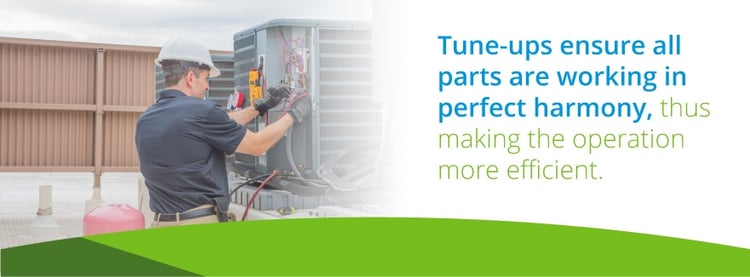
Dirty parts and clogged drains can sap efficiency. Worn parts can do the same. A regular tune-up will give a professional the opportunity to give your unit a thorough cleaning while making part replacements and minor adjustments as needed. Not only will this increase energy efficiency, but it will also extend the life of your air conditioner. Regular maintenance is far less expensive than a complete air conditioner replacement.
Air conditioners are also best left to professionals. The maintenance and disposal of coolants require careful handling. If released improperly, these chemicals can have a devastating impact on the environment. In fact, there are strict laws in place about the disposal of these chemicals. Failing to do so properly can result in hefty fines that far exceed the cost of hiring a professional.
Turning to the Wrong People for Maintenance
Finally, when choosing a maintenance professional, choose carefully. Unfortunately, there are many unscrupulous people out there who are more interested in getting your money than partnering with you to help your air conditioner reach peak performance. Picking the right maintenance company is an essential step in if you want to save money on AC maintenance.
Luckily, if you live in Maine, New Hampshire, Massachusetts, Rhode Island, Connecticut, New York, Maryland, New Jersey, Pennsylvania or Delaware, look no further than Smart Touch Energy for all your air conditioning maintenance needs.
As experienced HVAC professionals, we are dedicated to helping homeowners and businesses find the most effective and efficient ways to heat and cool their homes and offices. Our commitment to partnering with homeowners has earned us a peerless reputation for service and courtesy.
Our air conditioning tune-up service is designed to address every possible issue while ensuring your unit is working as efficiently as possible. This includes cleaning the evaporator and condenser coils, checking the condensate drain, checking coolant levels and pressure, lubricating parts, cleaning and adjusting the blower, replacing filters and measuring airflow, temperature differential, volts/amps and operating efficiency.
Also, if it does turn out that replacement is the best option for you, we will connect you with a dealer who will help you get the kind of unit that is best suited for your home. If you are ready to connect with your new preventative air conditioning maintenance partner, contact us today! We are eager to hear from you.



